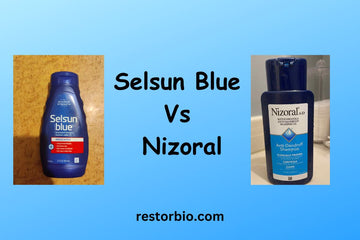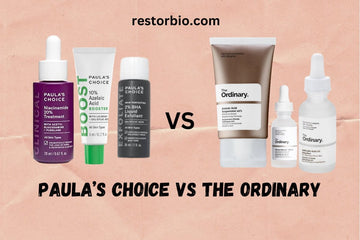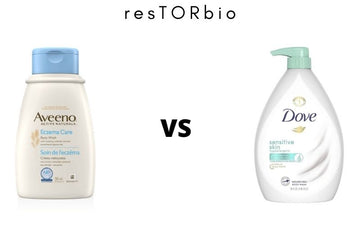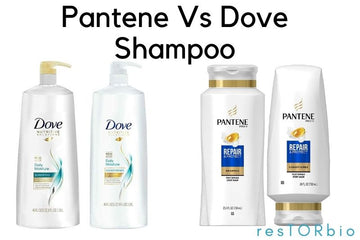
Sulfate-Free shampoo is a variant of standard shampoo (shampoo containing sulfates) that removes most of the existing dirt and helps your hair regain its natural cleanliness. The absence of sulfates in a shampoo ensures that no residue is left on your hair types, which often leads to itching.
Through our article, resTORbio will provide you with all the information about what is sulfate free shampoo and why it is beneficial for your hair.
What is Sulfate Free Shampoo?
As the name implies, sulfate-free shampoo is made without sulfate-based cleansers. Products are made to lather but not remove dirt, oil, or other unwanted buildup.
What is sulfate listed as in shampoo?
First things first, let’s define what sulfate actually is. Sulfate is a chemical compound that is commonly used as a foaming agent in shampoos, soaps, and other personal care products. It’s what causes your shampoo to lather up and create those satisfying suds that we all know and love. But here’s the thing, darlings: not all sulfates are created equal.
One of the most common sulfates used in shampoos is sodium lauryl sulfate (SLS), which is known to be quite harsh on the scalp and hair. It can strip away natural oils and cause dryness, irritation, and even breakage in some cases. SLS is often used in cheaper, mass-produced shampoos as it is effective at quickly and easily removing dirt and oil from the hair. However, my fabulous friends, there are many other sulfates out there that are much gentler and more suitable for those with sensitive or dry scalps.
One such sulfate is sodium laureth sulfate (SLES), which is often used in higher-end shampoos as it is a milder alternative to SLS. It still creates a good lather and cleanses the hair effectively, but is less likely to cause irritation or damage. Another sulfate that you may see listed on shampoo bottles is ammonium lauryl sulfate (ALS), which is a slightly less harsh version of SLS. While some people may still experience dryness or irritation with ALS, it is generally better tolerated than SLS.
So, my fabulous readers, the answer to the question “what is sulfate listed as in shampoo?” is a little more complex than you may have initially thought. While sulfate is a common ingredient in many shampoos, it can be listed under a variety of different names depending on the specific type that is being used. Some other names you may see include sodium coco sulfate, sodium lauryl sulfoacetate, and TEA lauryl sulfate.
What Sulfate Shampoos Can Do for Your Hair?
Sulfates, a type of surfactant that consists of a mixture of molecules that draw in oil and dirt and separate it from your hair, are a form of surfactant. Surfactants reduce the liquid surface tension by being mixed with water.

This allows foreign particles to escape from your body and go down the drain. Sulfate surfactants can be problematic because they strip away natural oils and proteins. This leaves your hair unprotected.
There are many sulfate compounds. The most common ones used in cosmetics are sodium laureth sulfate, sodium lauryl sulfate, and ammonium laureth sulfate.
How Sulfates Harm your Aging Hair?
Sulfates can cause hair loss in anyone, but they are especially harmful to those with aging hair. Menopause can lead to hair loss, reduced melanin production, shrinking follicles, and decreased vitamin and protein absorption.
These products can cause hair to lose its outer cuticle layer with age. Sulfates can push through and break apart roof-shingle-like cuticle cell membranes, causing them to lift and buckle. This exposes your inner cortex to heat and moisture, which can cause damage to your curly hair. Hair strands are more susceptible to breaking, splitting, and frizziness.
How Sulfates Harm your Aging Scalp?
Your sebaceous glands produce sebum at the base of follicles. It's a complex mixture of sugars and waxes. Your scalp is protected from water loss and disease-carrying pathogens by sebum.

As you get older, your sebum production decreases which can cause dry hair and scalp irritation. Sulfate shampoos strip your scalp of the necessary sebum to maintain healthy hair. This leaves your skin susceptible to infection, inflammation, and rashes.
Search for the best shampoo and conditioner? Please read our article to know more.
What are the Benefits of Sulfate-free Shampoo?
1) Use Natural Oils To Moisturize Your Hair
Shampoo containing sulfates foams up and effectively removes dirt and other debris from your hair. If you have dehydrated hair, shampoo that contains sulfates can strip your hair of its essential oils.
A sulfate-free shampoo is an excellent alternative because it doesn't strip your color-treated hair of its oils, which keep your hair healthy and shiny.
2) No More Fade
Your curly hair has just been color-treated. It is not what you want to see your hair fade after a month. You may notice a decrease in the shine and strength of your hair stypes if you wash it often. Many people swear that the best sulfate-free shampoos can help prevent fade.
You might be able to keep your color longer by switching to the best sulfate-free shampoo. This formula will keep your hair shiny and vibrant.

3) Moisture Can Stay
A sulfate-free shampoo is best for dry, tangled, and rough hair. Our Argan Oil & Aloe Vera Sulfate Free Shampoo repairs damaged hair and moisturize it. It also cleans well. This product does not strip hair of its moisture.
4) Strengthen Damaged Hair
It can be challenging to wash your hair when it is damaged or fragile. You don't want to make things worse. You don't want it to look oily or unmaintained. Sulfate-free shampoos can be used to clean your hair gently. This shampoo is sulfate-free and easy to spread.
If you are concerned about harmful ingredients in your shampoo, you can make your shampoo bar.
Why Brands Choose Sulfate-Free
Sulfates are commonly used in personal care products like body washes, shampoos, and toothpastes because they create a rich lather and effectively remove dirt and oil from the skin and hair. However, some brands are choosing to go sulfate-free.
One reason for this is that sulfates can be harsh and irritating to the skin, especially for those with sensitive skin or eczema. Sulfates can also strip the hair of its natural oils, leading to dryness and damage. By going sulfate-free, brands can offer a gentler option for consumers who are looking for a more natural and less irritating product.
Another reason for choosing sulfate-free is the growing demand for clean and natural products. Consumers are becoming more aware of the ingredients in their personal care products and are seeking out options that are free of harsh chemicals and synthetic fragrances. By going sulfate-free, brands can appeal to this growing market and position themselves as a more natural and eco-friendly option.
Finally, some brands are choosing sulfate-free because it aligns with their overall brand values. For example, a brand that focuses on sustainability and reducing their environmental impact may choose to go sulfate-free because sulfates can be harmful to aquatic life when they enter waterways.
Overall, there are several reasons why brands are choosing to go sulfate-free in their personal care products. By offering a gentler, more natural option, brands can appeal to a growing market of consumers who are seeking out clean and eco-friendly products.
FAQs
Are Sulfate-free Shampoos Better For Hair?
There is no scientific evidence to show that products with sulfates are gentler than other products without sulfates. The best sulfate-free shampoos may be beneficial for people who have an allergy to sodium laureth or sodium lauryl.
Do You Need Sulfate-free Shampoo?
These hair care products are best for those with frizzy hair. This is because these shampoos don't strip hair of its natural oils, which in turn leaves it full of moisture. This is also helpful if you have scalp irritation.

Can Sulfates Cause Hair Loss?
You could lose your hair temporarily if you are sensitive to sulfates-induced skin irritation. Excessive exposure to sulfates can cause protein loss, leading to hair weakness and breakage.
Video
Conclusion
Sulfate-free shampoo is considered one of the best variants of standard shampoo. The absence of sulfates ensures that you have clean hair and are free from residue.
It is a safe variant and will help your hair regain its natural cleanliness. On the other hand, if you have dehydrated hair, this variant will not be very beneficial. Thanks for reading our article and hope you liked it.




